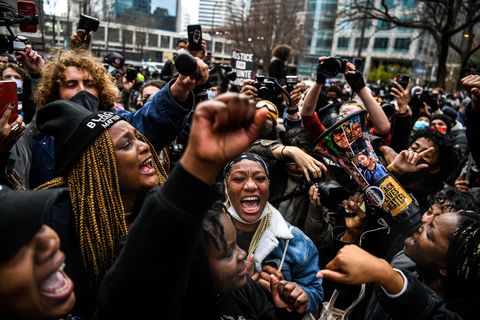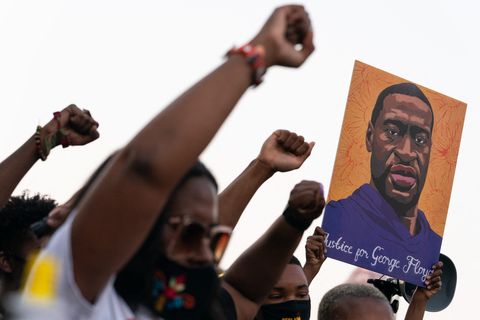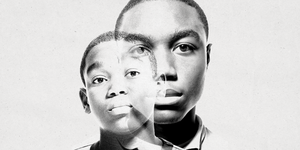One year ago today, police officer Derek Chauvin murdered George Floyd on the streets of Minneapolis, kneeling on Floyd's neck as he called out, “I can't breathe.” A video of the
incident made its way around the globe, prompting months-long protests and a national conversation about race and policing in America.
What is justice for George Floyd? We already know what it’s not: It’s not nine minutes and 29 seconds of begging for his life with a knee on his neck. It’s not having the most vulnerable moment of his life go viral for millions of people who look and love like him to see and feel. It’s not having his character assassinated in the media and by the very people who killed him and lived to tell the story. It’s not almost 10 months of global advocacy followed by a month-long trial.
I can’t deny that my jaw released, my shoulders dropped, and the corners of my lips turned upward at the sound of the judge reading: “Guilty. Guilty. Guilty.” I called my loved ones and shared their tears, knowing that something about Tuesday’s verdict was different. But the truth is nothing about this is justice. While the world cheered, a 16-year-old girl in Ohio named Ma’Khia Bryantwas being shot by Columbus Police, and just like that, reality kicked in. And as historian and activist Barbara Ransby pointed out, we can’t forget that this week, Florida’s governor signed a law that would criminalize the same kind of protests that followed George Floyd’s murder, that led to former police officer Derek Chauvin’s conviction. “[If] 26 mil ppl had not taken to the streets, we would have seen a very different outcome!” Ransby tweeted. Where is the justice in that?
This guilty verdict came at the expense of Floyd being vilified in death and his family being retraumatized through various testimony. This verdict doesn’t change the callous indifference Chauvin had as Floyd called out for his mother, described running out of air and desperately needing reprieve. Instead, according to the prosecution, Chauvin said: “It takes a lot of oxygen to complain.” Police in Floyd’s Minnesota are still killing, as are others, and new trials are being added to the dockets. We deserve so much more.

So what is justice for George Floyd? Justice for George Floyd would be celebrating his 47th birthday last October surrounded by his girlfriend, children, siblings, and grandchildren. Justice for George Floyd would be a world where the threat of counterfeit bills doesn’t make store employees dial 911.
In this just world, brute force isn’t needed to handle community disagreements, and Blackness isn’t a threat. It’s normal for everyday people to be trained in bystander intervention and know the people they live and work near, so the idea of calling armed officers on a fellow community member is out of the question.
In this just world, if a community mediator was called, they would be trained in advanced de-escalation tactics and would understand that a $20 bill isn’t worth losing a life. That person might follow up and ask why Floyd needed a counterfeit and if there was any way the community could support him. That mediator would never push a knee into the neck of a handcuffed person, minutes beyond their last breath.
In this just world, if God forbid George Floyd was murdered, no one would ask for proof or seek to play devil’s advocate. A 17-year-old girl wouldn’t have the weight of the world on her shoulders for having captured it on camera. We wouldn’t mince our words with language like “alleged,” because we’d understand that what his family needed most was honesty.
In this just world, everyone across the country would be invested in accountability—not protests demanding an arrest in order to hopefully get a conviction, but true accountability. Counseling and therapy services would be immediately secured for all of Floyd’s loved ones and every civilian on the street who was held back and forced to watch as he was killed. Through that counseling, every person involved would undergo a deep process of unpacking the white supremacy that allowed Chauvin to feel he had the right to Floyd’s breath.
In this just world, it wouldn’t be up to the kindness of strangers to fundraise for Floyd’s family. Reparations for brutality victims would be a mandate, paid for out of pension funds.

In this just world, there would be no trial where defense attorneys question if Floyd had a pattern of panicking with police or if he faked his response. In this world, a former medical examiner wouldn’t suggest in open court that it was Floyd’s heart disease that killed him after he was pinned to the ground. In this world, we wouldn’t be looking for scapegoats. We would be looking for healing and repair and a way to ensure this never happens again.
In this world, we would “recall” police until we could develop something better. And in the process, we would realize that there is so much better. We would meet people’s needs and commit to early and intentional childhood education to disrupt bigotry before it’s cemented. We would invest in schools and jobs and safety, not dependent on what zip code you live in or the color of your skin. We would train and employ unarmed violence interrupters, neighbor dispute mediators, substance abuse specialists, and more in order to address harm without compounding it.
Let’s be clear: The whole damn system is guilty as hell.
In this world, George Floyd and Breonna Taylor and Rayshard Brooks and Christian Hall and Daunte Wright and Ma’Khia Bryant and Sean Monterrosa and Adam Toledo and Layleen Polanco and Iremamber Sykap would all be alive now, preparing for a new day, loving and being loved. Instead, we mourn them and hope for a morsel of justice from the people in brotherhood with their killers.
I'm grateful that George Floyd’s family received what they asked for, but let’s be clear: The whole damn system is guilty as hell. As defense attorney Eric Nelson argued in court, Chauvin “did exactly what he had been trained to do over his 19-year career.” This is the most honest statement to come out of the entire trial, and we must heed its warning. More officers will do exactly as they were trained to do, and more people will be murdered if we don’t dismantle this system completely. We can’t stop until the deaths of Black people stop. That’s the only justice I seek.



